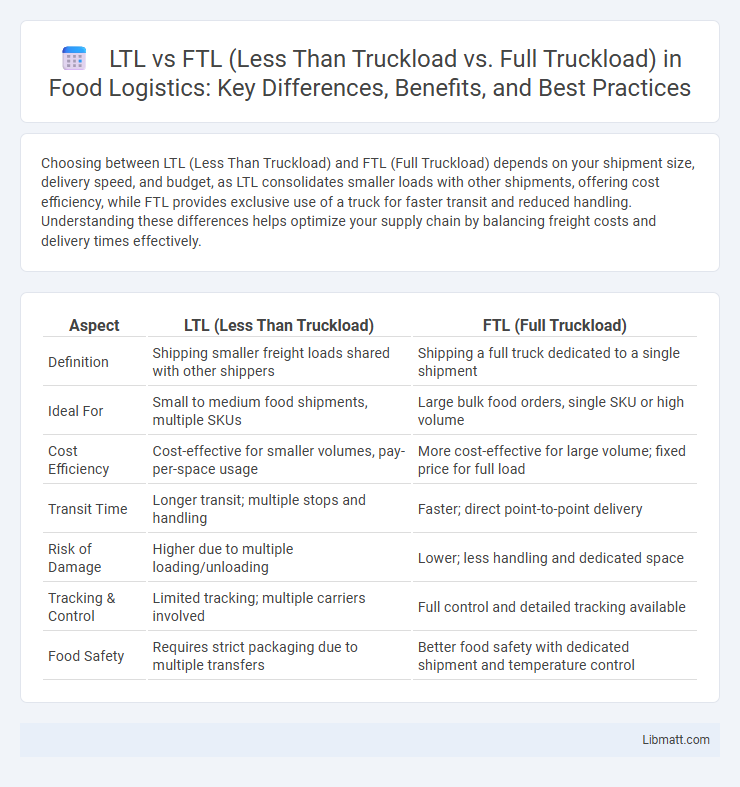Choosing between LTL (Less Than Truckload) and FTL (Full Truckload) depends on your shipment size, delivery speed, and budget, as LTL consolidates smaller loads with other shipments, offering cost efficiency, while FTL provides exclusive use of a truck for faster transit and reduced handling. Understanding these differences helps optimize your supply chain by balancing freight costs and delivery times effectively.
Table of Comparison
| Aspect | LTL (Less Than Truckload) | FTL (Full Truckload) |
|---|---|---|
| Definition | Shipping smaller freight loads shared with other shippers | Shipping a full truck dedicated to a single shipment |
| Ideal For | Small to medium food shipments, multiple SKUs | Large bulk food orders, single SKU or high volume |
| Cost Efficiency | Cost-effective for smaller volumes, pay-per-space usage | More cost-effective for large volume; fixed price for full load |
| Transit Time | Longer transit; multiple stops and handling | Faster; direct point-to-point delivery |
| Risk of Damage | Higher due to multiple loading/unloading | Lower; less handling and dedicated space |
| Tracking & Control | Limited tracking; multiple carriers involved | Full control and detailed tracking available |
| Food Safety | Requires strict packaging due to multiple transfers | Better food safety with dedicated shipment and temperature control |
Introduction to LTL and FTL Shipping
LTL (Less Than Truckload) shipping involves transporting smaller freight shipments from multiple customers in one truck, optimizing cost efficiency and flexibility for your smaller loads. FTL (Full Truckload) shipping dedicates an entire truck to a single shipment, offering faster transit times and reduced handling, ideal for larger or high-priority shipments. Choosing between LTL and FTL depends on shipment size, delivery speed, and budget considerations to maximize logistics efficiency.
What is Less Than Truckload (LTL) Shipping?
Less Than Truckload (LTL) shipping involves transporting small freight shipments that do not require the entire space of a full truck, allowing multiple shippers to share the cost of a single truckload. LTL shipments typically weigh between 150 and 15,000 pounds and are ideal for businesses needing to ship smaller quantities more cost-effectively. Your cargo benefits from consolidated transportation, reducing shipping costs while maintaining reliable delivery schedules.
What is Full Truckload (FTL) Shipping?
Full Truckload (FTL) shipping refers to the transportation of goods that fill an entire truck trailer, offering exclusive use of the vehicle for one shipment. Your cargo benefits from direct transit without additional stops or transfers, which reduces handling and potential damage. FTL is most cost-effective for large shipments or when time-sensitive delivery is essential, distinguishing it from Less Than Truckload (LTL) that combines multiple smaller loads.
Key Differences Between LTL and FTL
LTL (Less Than Truckload) shipping consolidates multiple small shipments from different customers into one truck, optimizing cost-efficiency for smaller freight loads, whereas FTL (Full Truckload) involves dedicating an entire truck to a single shipment, providing faster transit times and reduced handling for larger shipments. LTL typically has longer delivery times due to multiple stops and increased handling, while FTL offers direct routes with less risk of damage. Your choice between LTL and FTL depends on shipment size, budget, and urgency of delivery.
Cost Comparison: LTL vs FTL
LTL (Less Than Truckload) shipping generally offers lower costs for smaller shipments by allowing multiple shippers to share trailer space, reducing your overall freight expenses. FTL (Full Truckload) tends to be more cost-effective for large shipments or when you need faster transit times, as it eliminates the need for multiple handling and potential delays. Choosing between LTL and FTL depends on your shipment size, budget, and delivery requirements to optimize cost efficiency.
Shipping Speed and Delivery Times
LTL (Less Than Truckload) shipments generally have longer shipping speeds and extended delivery times due to multiple stops and consolidations with other freight. FTL (Full Truckload) offers faster transit by dedicating the entire truck to a single shipment, minimizing handling and route deviations. Businesses requiring expedited delivery often prefer FTL for its direct routes and reduced transit delays.
Types of Goods Suitable for LTL and FTL
LTL shipping is ideal for smaller shipments that do not require a full truck, such as packaged goods, retail products, and manufacturing parts, allowing multiple shippers to share space efficiently. FTL is best suited for large, heavy, or sensitive cargo that occupies an entire truck, including bulk commodities, oversized machinery, and perishable goods needing direct transportation. Choosing between LTL and FTL depends on your shipment size, urgency, and handling requirements to optimize cost and delivery speed.
Pros and Cons of LTL Shipping
LTL shipping offers cost-efficiency by allowing multiple shippers to share space on a single truck, reducing expenses for small to medium-sized shipments. It provides flexibility for businesses that don't require a full truckload, but can result in longer transit times and increased handling, potentially increasing the risk of damage. Your choice between LTL and FTL depends on shipment size, budget, and delivery urgency.
Pros and Cons of FTL Shipping
Full Truckload (FTL) shipping offers faster transit times and reduced risk of damage since your goods occupy the entire trailer, minimizing handling and stops. You benefit from cost efficiency when shipping large volumes or heavier freight, but FTL can be more expensive if you don't have enough cargo to fill the truck, leading to underutilized space. Your choice depends on shipment size, budget, and timing urgency, with FTL being ideal for bulk shipments requiring speed and higher security.
How to Choose Between LTL and FTL for Your Business
Choosing between Less Than Truckload (LTL) and Full Truckload (FTL) shipping depends on the size, weight, and urgency of your shipment. LTL is cost-effective for smaller shipments that do not require a full truck, ideal for businesses with frequent, smaller orders aiming to reduce shipping expenses. FTL is best for large, time-sensitive shipments needing direct transit, offering faster delivery and reduced handling risks for businesses prioritizing speed and product integrity.
LTL vs FTL (Less Than Truckload vs Full Truckload) Infographic

 libmatt.com
libmatt.com